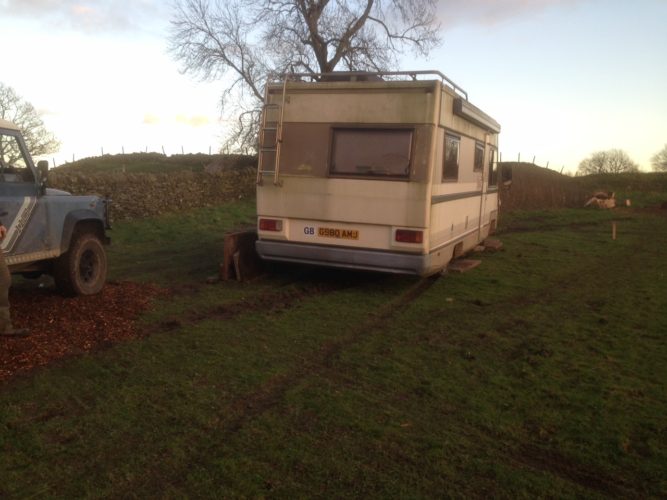
We woke up to the van rocking from side to side enthusiastically as huge noisy trucks hurtled past it.
Clearly the road had been reopened.
We had our coffee and contemplated our world. We thought we rather liked the rocking, a bit like being on a gentle sea apart from the thunderous traffic roar.
After some reflection we decided that it wouldn’t be a good idea to go outside for a walk, on account of the four lanes of high-speed heavy goods vehicles a couple of yards away from our front door. Instead we opened the windows and let the fresh air blow in until the morning began to drip away, and we thought we had better go.
We were having a quiet worry about fields and sheds and reorganising our lives, so we thought that on our way back through Kendal we would pop into the National Park offices to see when they had got to say about it all.
The thing about living in a rural theme park is that the National Park Authority is allowed to do an unspeakable amount of interfering. I once had a letter from them complaining that we came in from work at night far later than we should, and also that we came in and out of our house too often.
Obviously I wrote the rudest of middle-class indignant replies, since even the National Park has no power to impose curfews, but the point is that they really believed that it was all right for them to say it. There was nobody there who read the letter they had just written and laughed and decided maybe they had better not post it.
The Duty Planning Officer was not especially helpful. Actually she was so unhelpful she could have got a job driving a taxi. She was as guarded and unsmiling as if she had been expecting us to run off without paying and leaving a pile of sick on her carpet.
She said that the National Park wanted to know whatever we were doing, and that if they thought we were using a corner of our field for storage rather than agriculture she would want to know why. We explained that much of it was agricultural storage, like the digger and the stock trailer, and she looked at us suspiciously and said that they might want to check, so we had better be sure.
We came away feeling weary of National Parks and wishing that we had got the sort of job that you could do in other places.
We went off to our field then, where we revitalised ourselves with an enormous dinner and a glass of wine.
We badly wanted a little sleep, but we didn’t.
Instead we needed to move Number One Daughter’s camper van, about which we are having some concerns, partly because it is quite noticeably a broken down camper van and not something agricultural.
Mark jacked it up and we shoved flagstones under the wheels.
We laid two long flagstone tracks in front of it, and Mark dug a bit of ground out with the digger so that it would be flat and tidy.
Such a short sentence for such a long time of muscle-wrenching labour.
The flagstones are two feet square and weigh a very lot. Especially they weigh a very lot when you are slipping and sliding up a muddy hillside in the rain.
I know it doesn’t look in the picture as though it is raining. That is because I took the picture last week. Today it was raining hard. It was horrid. The picture does not give you the first idea of the dreadful black oily ooze in which we were staggering around today.
When we had finally got the track laid Mark attached the tow rope to the digger bucket. He anchored the digger down firmly, and I steered whilst he slowly winched the camper van forward a couple of feet with the digger bucket. Then he dropped the digger down, backed up a little, and we did the same again.
It took ages.
We moved it about eight yards forward. This was not very much, but it was enough for our purposes. Any agricultural structures, however temporary, have got to be twenty five metres away from any road. The camper van is not exactly a structure any more than it is agricultural, but in the event that the National Park decide to become truculent, we thought we would be as close as possible to being on the right side of whatever rules they have already managed to dream up. We can always tell them it is going to be a hen house.
After that we chucked a plastic sheet over it, which wasn’t big enough, and decided that we had had enough. It was dark, and we were wet and muddy and beginning to feel cross.
We went home to get ready for work, which is where we are now.
I am tired and dirty.
When I win the lottery I am never going to do anything in wet mud ever again.
